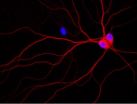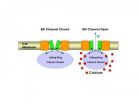(Press-News.org) DURHAM, N.C. – Birds do it. Bees do it. Even little kids picking strawberries do it.
Every creature that forages for food decides at some point that the food source they're working on is no richer than the rest of the patch and that it's time to move on and find something better.
This kind of foraging decision is a fundamental problem that goes far back in evolutionary history and is dealt with by creatures that don't even have proper brains, said Michael Platt, a professor of neurobiology and director of the Center for Cognitive Neuroscience at Duke University.
Platt and his colleagues now say they've identified a function in the primate brain that appears to be handling this stay-or-go problem. They have found that the dorsal anterior cingulate cortex (ACC), an area of the brain known to operate while weighing conflicts, steadily increases its activity during foraging decisions until a threshold level of activity is reached, whereupon the individual decides it's time to move on.
In lab experiments with rhesus macaque monkeys, Platt and postdoctoral fellows Benjamin Hayden and John Pearson put the animals through a series of trials in which they repeatedly had to decide whether to stay with a source that was giving ever-smaller squirts of fruit juice, or move to another, possibly better, source. The animals were merely gazing at a preferred target on a display screen, not moving from one tree to the next, but the decision-making process should be the same, Platt said.
For the other variable in this basic equation, travel time, the researchers added delays when monkeys chose to leave one resource and move to another, simulating short and long travel times.
As the monkeys repeatedly chose to stay with their current source or move to another, the researchers watched a small set of neurons within the anterior cingulate cortex fire with increasing activity for each decision. The rate of firing in this group of neurons grew until a threshold was reached, at which time the monkey immediately decided to move on, Platt said. "It is as if there is a threshold for deciding it's time to leave set in the brain," he said.
When the researchers raised the "travel time" to the next foraging spot in the experiment, it raised the decision-making threshold, Platt said.
This all fits with a 1976 theory by evolutionary ecologist Eric Charnov, called the Marginal Value Theorem, Platt said. It says that all foragers make calculations of reward and cost that tell them to leave a patch when their intake diminishes to the average intake rate for the overall environment. That is, one doesn't pick a blueberry bush until it's bare, only until it looks about as abundant as the bushes on either side of it. Shorter travel time to the next patch means it costs less to move, and foragers should move more easily. This theorem has been found to hold in organisms as diverse as worms, bees, wasps, spiders, fish, birds, seals and even plants, Platt said.
"This is a really fundamental solution to a fundamental problem," Platt said.
Platt said the work also relates to recent papers on the Web-browsing habits of humans. In the case of Internet users, the cost of travel time translates to download speed. The faster the downloads, the quicker browsers are willing to forage elsewhere, Platt said.
They aren't sure yet where the brain's signaling goes after the stay-or-go threshold in the ACC is reached. Platt believes this kind of "integrate-to-threshold" mechanism would be a good way to handle a lot of functions in the brain and may be found in other kinds of systems. This particular threshold in the ACC might also be a way to explain maladaptive behaviors like attention deficit, in which a person decides to move on constantly, or compulsive behavior, in which a person can't seem to move on at all, he said.
###
The research appears online in Nature Neuroscience, June 5, 2011. It was supported by the National Institutes of Health and a fellowship from the Tourette Syndrome Association.
CITATIONS:
"Neuronal basis of sequential foraging decisions in a patchy environment," Benjamin Y. Hayden, John M. Pearson, Michael L. Platt. Nature Neuroscience, Advance Online, June 5, 2011. doi: 10.1038/nn.2856
"Information foraging," Pirolli, Peter; Card, Stuart
Psychological Review, Vol 106(4), Oct 1999, 643-675. doi: 10.1037/0033-295X.106.4.643
Deciding to stay or go is a deep-seated brain function
2011-06-07
ELSE PRESS RELEASES FROM THIS DATE:
RakeTheRake's Re-Branded Site Offers $100,000+ of Special Promotions
2011-06-07
RakeTheRake.com has re-launched its rakeback website to give online poker players new features, functionality and an improved user experience. With a simple 4 step process to sign up for rakeback and a secure, easy to use Account area, the new site offers players some key additions, namely free poker training and the new RakeTheRake forum.
Until the end of July 2011 there is also $100,000+ of special relaunch promotions running. These are bespoke promotions created by the top online poker rooms and RakeTheRake and most are open to all online poker players, whether registered ...
Neutron analysis explains dynamics behind best thermoelectric materials
2011-06-07
OAK RIDGE, Tenn., June 6, 2011 -- Neutron analysis of the atomic dynamics behind thermal conductivity is helping scientists at the Department of Energy's Oak Ridge National Laboratory gain a deeper understanding of how thermoelectric materials work. The analysis could spur the development of a broader range of products with the capability to transform heat to electricity.
Researchers performed experiments at both of ORNL's neutron facilities -- the Spallation Neutron Source and the High Flux Isotope Reactor -- to learn why the material lead telluride, which has a similar ...
Columbia, SC Hotel Offers Nearby Lodging to Guests Attending the Miss South Carolina Pageant
2011-06-07
The Hilton Garden Inn Hotel in Columbia SC (Northeast) offers convenient lodging to competitors and spectators attending the Miss South Carolina Pageant. The event will take place at the newly renovated Township Auditorium from June 25 - July 2, 2011. Contestants from across the state of South Carolina will compete for the crown and a $20,000 scholarship.
After begin held in Spartanburg for the past 15 years, the Miss South Carolina Pageant will take place in Columbia, South Carolina. The event will include the Miss South Carolina Finals and Miss South Carolina Teen ...
UCSB scientists discover new direction in Alzheimer's research
2011-06-07
(Santa Barbara, Calif.) –– In what they are calling a new direction in the study of Alzheimer's disease, UC Santa Barbara scientists have made an important finding about what happens to brain cells that are destroyed in Alzheimer's disease and related dementias. The results are published in the online version of The Journal of Biological Chemistry.
Stuart Feinstein, professor of Molecular, Cellular and Developmental Biology, senior author, and co-director of UCSB's Neuroscience Research Institute, explained: "With dementia, the brain cells, or neurons, that you need for ...
Adding a Body Kit to Your Car or Truck Can Really Change It's Looks. But If You're Going to Drive it on the Street Are You Concerned About Your Safety? There Are a Few Things You Should Consider.
2011-06-07
Most people who buy a body kit for their car or truck are looking forward to making the vehicle more aggressive, a custom appearance, and completely unique. Yet the last thing that they think of when messing around with their bumpers is safety. It's kind of crazy really, some are willing to risk their safety just so they can look good.
We are proud of what we drive, but we are all unique. We like to show our style, or even enter our vehicle into some car or truck shows. One of the most drastic things that you can do to your vehicle is to add a custom body kit to it. ...
UCLA scientists identify how major biological sensor in the body works
2011-06-07
A biological sensor is a critical part of a human cell's control system that is able to trigger a number of cell activities. A type of sensor known as the "gating ring" can open a channel that allows a flow of potassium ions through the cell's wall or membrane — similar to the way a subway turnstile allows people into a station. This flow of ions, in turn, is involved in the regulation of crucial bodily activities like blood pressure, insulin secretion and brain signaling.
But the biophysical functioning of the gating ring sensor has not been clearly understood. Now, ...
New Foundation Focuses on Keeping Young People Safe Abroad
2011-06-07
A new nonprofit foundation has formed to help protect the safety of millions of young people who travel and study abroad every year. ClearCause Foundation is focused on solving problems within the US $17 billion youth-travel, exchange and study abroad industry without government regulations, including the lack of federal oversight for organizations entrusted to care for youth and students overseas.
"There are literally thousands of youth travel, study-abroad and student-exchange programs, but virtually no government oversight or federally mandated safety standards ...
Jupiter's youthful travels redefined solar system
2011-06-07
Jupiter, long settled in its position as the fifth planet from our sun, was a rolling stone in its youth. Over the eons, the giant planet roamed toward the center of the solar system and back out again, at one point moving in about as close as Mars is now. The planet's travels profoundly influenced the solar system, changing the nature of the asteroid belt and making Mars smaller than it should have been. These details are based on a new model of the early solar system developed by an international team that includes NASA's Goddard Space Flight Center in Greenbelt, Md. ...
GO Campaign, Lemelson-MIT, and P90X Creator Tony Horton Launch Global Search for Innovators, Granting $50,000 in GO Innovation Awards to Inspire Youth to Solve Real World Problems
2011-06-07
GO Campaign, a non-profit organization supporting orphans and vulnerable children throughout the developing world, Lemelson-MIT, and P90X Creator Tony Horton are announcing the launch of GO's global search for innovators and entrepreneurs who are sharing their innovations with youth and inspiring them to create solutions for the real world community problems they face. Up to $50,000 will be granted annually to GO Innovation Award (GIA) recipients.
In addition to inviting participation in the global search, GO Campaign will call for private sector support by corporations, ...
Archive Systems Unveils OmniRIM Records Center
2011-06-07
Archive Systems, Inc., a leading provider of records and document management services, today announced the release of OmniRIM Records Center, a cloud-based solution that gives organizations the power to access, protect and control their business-critical information. It features Archive Systems' acclaimed physical records management functions, seamlessly integrated with electronic records management capabilities to provide secure lifecycle management of a company's valuable informational assets.
OmniRIM Records Center is the first SaaS-solution to unify electronic and ...



